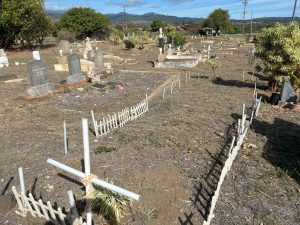STATE SELECTS SITE FOR BATTLE OF HANAPĒPĒ MEMORIAL
Posted on Jan 16, 2025 in MainLĪHUʻE, KAUAʻI — Just over a century ago, 16 Filipino strikers and four police officers died in a violent clash over a labor strike in Hanapēpē. It is considered by many a foundational and tragic episode in Hawai‘i’s labor rights history.
The State of Hawaiʻi Department of Accounting and General Services (DAGS) is another step closer to erecting a monument to remember the 1924 Battle of Hanapēpē. It has identified a location at the front of Hanapēpē Filipino Cemetery, where the strikers are buried in a mass grave.
Governor Josh Green, M.D., said, “This was one of a series of strikes over decades, but out of this pain came progress in the labor movement. Because of these plantation workers’ sacrifices, powerful unions exist today to advocate for worker’s rights.”
In September of 1924, Filipino workers – mostly Visayan – across all the Territory’s sugar plantations, went on strike. They were camped out in Hanapēpē, with demands of more money, from one dollar a day to two dollars; and fewer working hours, from 10 hours a day to eight hours.
On Sept. 8, 1924, a Visayan strike camp kidnapped two Ilocano strike breakers to prevent them from crossing the picket line. On Sept. 9, when the sheriff and police tried to free the captured men, a deadly confrontation broke out, resulting in 20 deaths and over 100 arrests. In the end, 58 strikers pled guilty and received a four-year prison sentence.
DAGS Director Keith Regan stated, “It is important to remember this key moment in our history. These workers fought and died for better pay and better working conditions. It’s because of them we can enjoy an eight-hour day, safe working conditions and fair labor practices.”
The memorial will consist of two concrete columns with a gap between them, symbolizing two sides of the conflict. DAGS Kauaʻi District Office Program Manager Eric Agena added, “The way they’re oriented is that no matter the time of day, there’s always a shadow cast. The shadow represents that dark chapter of labor history.”
The committee is still in the planning stages, with a target date of late 2026 to install the memorial.


